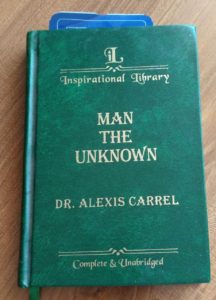 Alexis Carrel 28 June 1873 – 5 November 1944) was a French surgeon and biologist who was awarded the Nobel Prize in Physiology or Medicine in 1912 for pioneering vascular suturing techniques. He invented the first perfusion pump with Charles A. Lindbergh opening the way to organ transplantation.
Alexis Carrel 28 June 1873 – 5 November 1944) was a French surgeon and biologist who was awarded the Nobel Prize in Physiology or Medicine in 1912 for pioneering vascular suturing techniques. He invented the first perfusion pump with Charles A. Lindbergh opening the way to organ transplantation.
This book man the unknown was one of the five books Dr APJ Abdul Kalam always kept at hand.
When men and women of science focus their attention on humanity as a whole instead of restricting themselves to their narrow fields of expertise the outcome is absolutely illuminating, educative and at times shocking !
The book is of just 300 pages and any attempt to summarise it wouldn’t do justice. I have quoted certain parts verbatim to give a very brief indication of what the book is about . I am afraid , the review may not make much sense till one gets hold of the book and at least skim over the pages. The book is definitely worth not just skimming over but reading and re reading even if one does not agree with everything the author has to say.
The book is organized into eight chapters.
The introduction says
THIS BOOK is having the paradoxical destiny of becoming more timely while it grows older.
Today, the way our social media is playing havoc with our lives driving people to violence or depression, the book is more relevant now after almost a century after its first publication.
The first chapter deals with how human civilization (mostly the western civilization) focused more on the study of inane objects mostly because it was possible to measure , weigh and experiment. We lack knowledge of ourselves due to the complexity and the inherent difficulty in studying empirically.
The second and third chapters cover briefly the human body and physiological activities. These chapters are written as how a scientist would explain complex subjects to a lay man.
The fourth chapter is on mental activities. Here two issues are highlighted; firstly that mind and matter cannot be studied separately and secondly that moral sense is far more important than intelligence. Doesn’t sound very scientific ?!
The fifth chapter discusses the process of ageing. But the author goes beyond solar time and analyses chronological age along with physiological and psychological age.
Sixth chapter is about adaptive functions. It talks of how a human being adapts and changes physiologically and psychologically to challenges from the environment. I wonder if anyone is studying this aspect in the light of the challenges humankind is facing from the current pandemic.
The seventh chapter is about individuality of each human being. There are many politically incorrect statements on the concept of equality . Each individual is unique and he or she should be treated as such whether from the point of view of employability or health-care or for rights and responsibilities.
The last and the most important chapter is titled “Remaking of Man”. Here, the author gives out definite steps to create a society of individuals free from the the clutches of blind technology and grasp the complexities and wealth of our own nature.
I give below some of the powerful words from the book that indicates the author’s line of reasoning.




A book definitely worth reading.

Thanks. Your review has definitely generated a spark and will love to read the book now. Unfortunately, ever since one has got used to present forms of social media platforms the habbit of picking a book has taken a back seat when compared with picking a mobile phone. Challenge for myself now
Initially , I tried looking for it in some book stores. Though it is considered. a classic and part of ‘Inspirational Library ‘ hardly any bookseller was aware of it.
Finally got it from Amazon.
“When men and women of science focus their attention on humanity as a whole “,
“mind and matter cannot be studied separately and secondly that moral sense is far more important than intelligence”,
“create a society of individuals free from the the clutches of blind technology and grasp the complexities and wealth of our own nature”,
” Modern society has
committed a serious mistake by entirely substituting the school for familial training”.
It’s like completing the circle. Is it not where Indian knowledge and wisdom already was from whence modern sciences started their quest for knowledge based on empirical evidence?
Dear scientists, please come to India. The answers to all your questions are available here; they have been here for a thousand years and more.